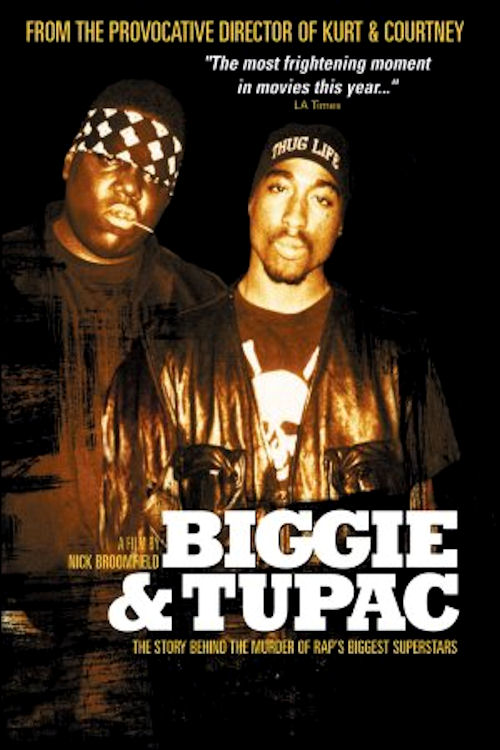Anthony's Film Review
Biggie and Tupac (2002)

A documentary film that provides an intriguing glimpse into the deaths of two hip-hop superstars...
In the 1990s, the world of hip-hop lost not one but two rap artists to fatal gunfire. In late 1996, Tupac Shakur was gunned down in Las Vegas, and in early 1997, Christopher Wallace, a.k.a. Biggie Smalls, a.k.a. The Notorious B.I.G., was shot to death in Los Angeles. On the surface, particularly to anyone not too interested in rap music, this seems like the case of a rivalry that took a really ugly turn. That may be the official story to some people, but as the 2002 documentary film Biggie and Tupac illustrates, the real story may be far more shocking than it looks.
At first, the film appears to be biographical. Director Nick Broomfield, a British documentary filmmaker, interviews various people who knew Biggie and Tupac, including Tupac's mother, Biggie's mother, Tupac's performing arts teacher, Biggie's co-worker in a grocery store, and even Tupac's biological father. It's rather nice to get a sense of who these two slain rappers were: young creative talented men who were destined for success. These interviews are accompanied by candid footage of Biggie and Tupac that show how innocent they were before they became famous.
This leads into what the film is really about: an investigation into their deaths. To set the scene, Broomfield briefly explains the East Coast-West Coast hip-hop rivalry. Apparently, there are two recording labels that both produce rap music but each want success for themselves. On the East Coast is Bad Boy Records, whose music includes that performed by Sean Combs, a.k.a. Puff Daddy. On the West Coast is Death Row Records, which rapper Snoop Dogg had a contract with. When Biggie signed up with Bad Boy Records and Tupac joined Death Row Records, the rivalry soon became defined by these two performers, not just their record labels.
So if the deaths of Biggie and Tupac did not actually stem from this rivalry, what was behind it? Well, Russell Poole, a former Los Angeles police detective, has a theory: that the killings of Biggie and Tupac were an inside job. Supposedly, Death Row Records producer Marion "Suge" Knight ordered Tupac murdered because the rapper, after achieving phenomenal success, wanted to leave the record label, and the killing of Biggie would be a way to distract attention away from Death Row Records and pin it all on the East-West hip-hop rivalry. It's interesting how, in this film about Biggie and Tupac, the real central character really seems to be Suge Knight.
And that is the direction the rest of this film takes. Broomfield proceeds to interview various former bodyguards and other figures who were close to Biggie and Tupac at the time of their deaths. What's astonishing is how Broomfield explores topics that seem remotely connected but are nevertheless quite relevant, including corruption in the Los Angeles Police Department, as with the Rampart scandal in 1997. With regard to police corruption, this is an important topic for the film, because former LAPD detective Poole believes that there are officers who are in league with Death Row Records, usually as moonlighting security officers, and that the LAPD purposely did not investigate the Biggie-Tupac murders because it would expose these corrupt officers.
I'm not going to say what happens next, but I will say that I thought the last part of the film was worth seeing. It's the kind of ending that brings a sense of closure, even if there really is no true closure. When the film ended, I couldn't help but admire how Broomfield, being a filmmaker from across the Atlantic, got his facts straight when narrating the events leading up to the two rappers' deaths. He is certainly a director who puts emphasis on the content of his film, not so much the look and technical quality of his film, which are relatively low-key and really not important anyway. All in all, Biggie and Tupac is a pretty good documentary, for fans of the two slain rappers and for anyone who enjoys an intriguing mystery with a quest for uncovering the truth.
Anthony's Rating:










For more information about Biggie and Tupac, visit the Internet Movie Database.
Home
Film Reviews
Other Reviews
Commentaries
Links
About AFR
RSS Feed
Privacy Policy
E-mail Anthony











